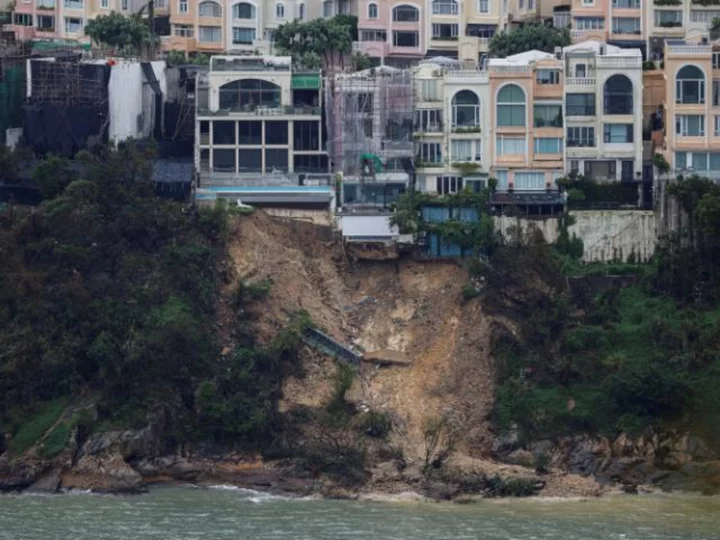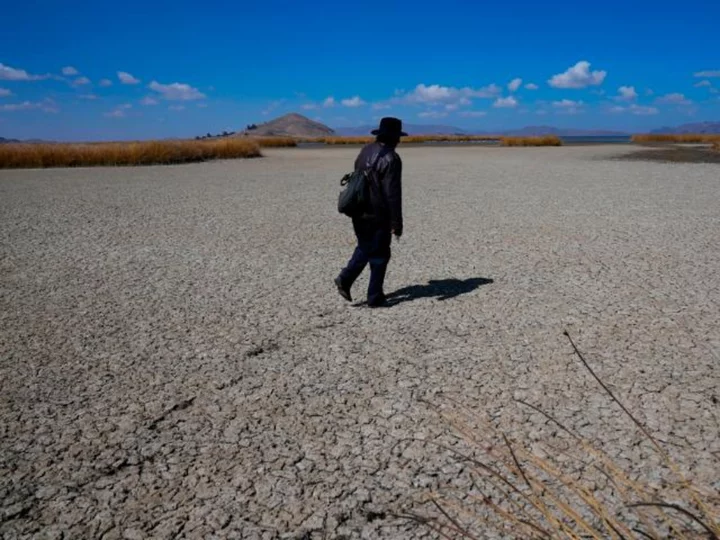Until recently, the upscale homes of the Redhill Peninsula seemed like an oasis for rich Hong Kongers aspiring to a tranquil lifestyle in an otherwise notoriously cramped metropolis of 7.5 million.
Its cliffside location and unobstructed views of the South China Sea made for great Feng Shui and offered the perfect antidote to the hustle and bustle of city life for its gated community of tycoons, expats and celebrities.
But that same pristine location worked against it on September 8, when a storm brought the heaviest rainfall in nearly 140 years to Hong Kong, wreaking havoc across the city.
Two people were killed and more than a hundred injured as more than 600mm (23.6 inches) of rain barreled down on the coastal city, flooding metro stations and turning roads into rivers.
The chaos was not confined to the flooded lowlands. Up on the edge of the cliff separating the Redhill Peninsula from the sea below it chipped away at the soil, leaving three millionaire homes perilously close to the edge and prompting an evacuation.
In a city that had just experienced its hottest summer on record, the unprecedented rainfall -- itself the product of the second typhoon to have hit the city in the space of a week -- was a potent demonstration of the threat posed by climate change and its associated extreme weather.
But for the residents of the Redhill Peninsula it was also a reminder that climate change is rewriting the rules of what can be considered "safe" construction, and that even the costliest, most well-constructed homes can be vulnerable.
For some it may even be a reminder that such rules exist at all. City authorities say they are investigating whether building code violations in some of the houses contributed to the problem, in a development likely to fuel perceptions that the rich don't play by the same rules as the poor.
Whatever those investigations find, experts say extreme weather events like that of September 8 will become more frequent and when they do rich and poor alike will suffer the consequences -- whichever rulebook they play by -- even if the former have far more ability to bounce back from disasters than the latter.
As Benny Chan, the president of Hong Kong Institute of Architects, points out, Hong Kong has long been prone to typhoons and torrential downpours and has "plenty of experience building these kinds of cliffside houses."
It also has stringent safety standards designed over many years with landslides in mind, he says. So it would have been reasonable -- at least until a couple of weeks ago -- to expect somewhere like the Redhill Peninsula to be a safe place to be in a storm.
But the old rules, experts say, may no longer apply.
A 'sensitive' issue
That is likely to be an uncomfortable realization for anyone who has invested in the Redhill Peninsula -- one of the most expensive neighborhoods in one of the world's most expensive property markets.
Properties here have the sort of appeal and cachet of the Malibu coast in Los Angeles. They have a distinctive Mediterranean style, with colors alternating in hues of cream and pink, and many have french windows overlooking the cove of Tai Tam, a scenic spot with a lush hiking trail nearby and ample shelter for luxury yachts to anchor below.
They can go for between $10 million-$20 million for a 2,400-3,600 square foot home (and rent for up to $20,000 a month). Or at least, they could before the recent downpour. Local real estate agents say what effect the storm will have on property prices is a "sensitive" issue for some in the community.
When CNN visited Redhill last week, sports cars and SUVs sporting the logos of Porsche, Land Rover and Ferrari were among the vehicles that cruised past the palm-tree-lined entrance, where a security guard stood like an impenetrable wall preventing the gaggle of assembled journalists from going in.
The real pull of the district, according to a real estate agent with more than two decades of experience selling properties here, is its tight-knit community.
"It has an international school and kids can hang out with one another at home after school," said the agent, speaking on the condition of anonymity due to the sensitivity of the issue. She was referring to the Hong Kong International School, one of the most prestigious in town.
"Almost every house comes with a view of the sea," she said, adding that while the development is far from the hustle and bustle of the city, it offers a convenient shuttle bus service to ferry residents around.
The three houses most affected by the landslides were between 2,700 and 3,000 square feet in size, each valued at up to $11.5 million, the agent said.
She added that she had noticed a change of mood in recent days and expects anyone trying to sell a property -- especially one near to the sea -- to lay low for a while.
"It's sensitive timing," she said.
The old rules may not apply
Heavy rain is far from unusual in Hong Kong, especially during the summer months.
Even so, recent weather patterns have been unsettling to many, with two consecutive typhoons sweeping across the region within a space of less than two weeks.
Typhoon Saola, which barreled through Hong Kong on September 1, was the strongest to hit the city in five years. A week later, the remnants of Typhoon Haikui unleashed the rains that caused the problems at Redhill, dozens of landslides and left large swathes of the city underwater.
Scientists say climate change will make such weather events only more frequent and some are urging Hong Kong to rethink its rain mitigation strategy.
Leung Wing-mo, former assistant director of the city's weather observatory, told public broadcaster RTHK that rainstorms are becoming harder to predict because of climate change.
"In the past few decades, record-breaking events have been occurring much, much more frequently...This is a clear indication that climate change has a role to play. As a matter of fact, climate change is making extreme weather more extreme," Leung said.
With that in mind, architects and civil engineers are also calling for the city to review standards set decades ago for hillside buildings, including many luxury mansions.
The city experienced some of its worst landslides in the 1970s, including one that knocked down a series of residential buildings in the city's upscale Mid-Levels district, causing 67 deaths.
The same powerful rain that caused the Mid-Levels landslide in 1972 also triggered a hill in a district of Hong Kong's Kowloon Peninsula to collapse, decimating a squatter site in Sau Mai Ping causing a further 71 deaths.
Structural engineering professor Ray Su, from the University of Hong Kong, said that the series of catastrophic incidents had prompted the government of the time to reinforce slopes across the city, turning Hong Kong into one of the most resilient places against landslides and floods in the world.
But some engineers fear safety rules that seemed adequate in the past may no longer be enough.
Su noted that some of the city's low-rise houses were still built on shallow footings.
In extreme rain scenarios, "they will take a big hit when landslides crumble down," he said.
'A ticking time bomb'
Complicating matters in the case of the Redhill Peninsula is the suggestion by authorities that some of properties in danger may not even have been playing by the old rules.
In the wake of the storm, government authorities detected what they suspect may be illegal alterations made to the three Redhill properties -- alterations that experts say may have contributed to the disaster.
That suggestion is something of a third rail issue in a city that has a track record of scandals involving wealthy individuals and politicians altering their properties and violating building codes with the sort of illegal extensions skeptics say the less well-off wouldn't get away with.
Hong Kong's Buildings Department says among those unauthorized modifications are basements, a swimming pool, and a three-story extension.
So controversial is the issue that even the city's leader John Lee has stepped in, vowing that the government will investigate and prosecute anyone found to have violated building codes.
"The landslide at Redhill Peninsula has already shown us that part of the estate carries risks, so relevant departments will target the estate for inspections," he said last week.
Preliminary investigations have shown a retaining wall was demolished in one of the houses.
Chan, from the Hong Kong Institute of Architects, said the modification could destabilize the structure of the cliff below and greatly affect the drainage of the soil underneath, ultimately causing landslides.
"The more the water is trapped, the less the slope can maintain a high steepness," Chan said.
He said while painful lessons in the past had given rise to high standards on building retaining walls and drainage systems, the old set of requirements is slowly losing relevance.
"These standards were set a long time ago," he said.
"Can the present standards withstand that much rain? It is time for the government to look at them again," he added.
Chan Kim-ching, founder of Liber Research Community, a non-government organization that focuses on scrutinizing the authorities on land policies, said the safety problems that arose from illegal modifications went far further than the cases at Redhill.
His group recently compared contracts available on public records and identified at least 173 individual houses across the city suspected of violations on public land.
"We studied it in the past because it involves the fair use of public resources. Never did it strike us that it's an issue that would threaten public safety," he said.
"It is like a ticking time bomb," Chan said.









